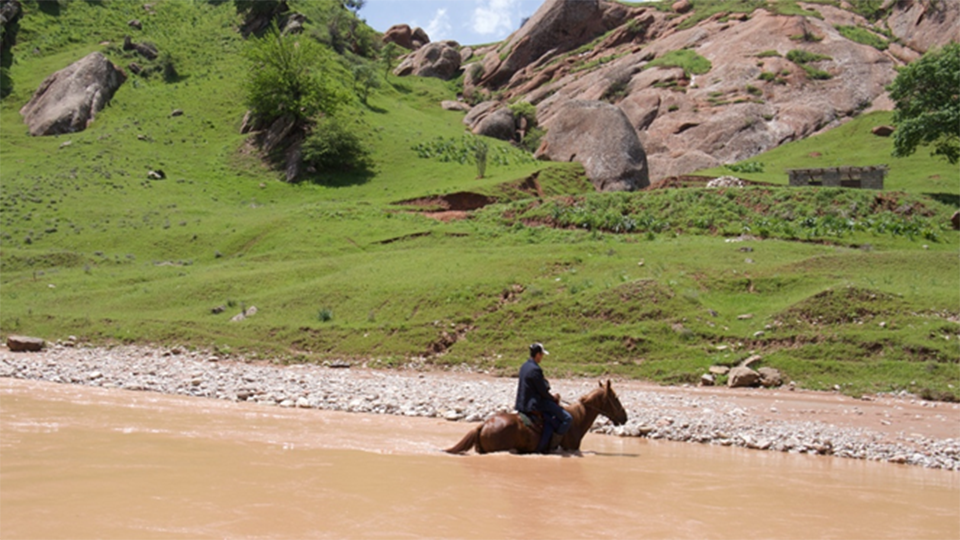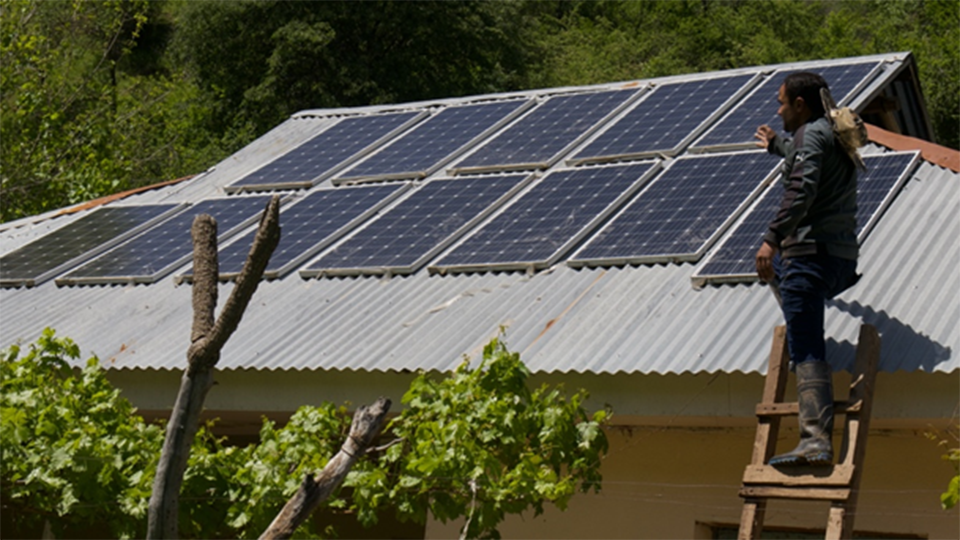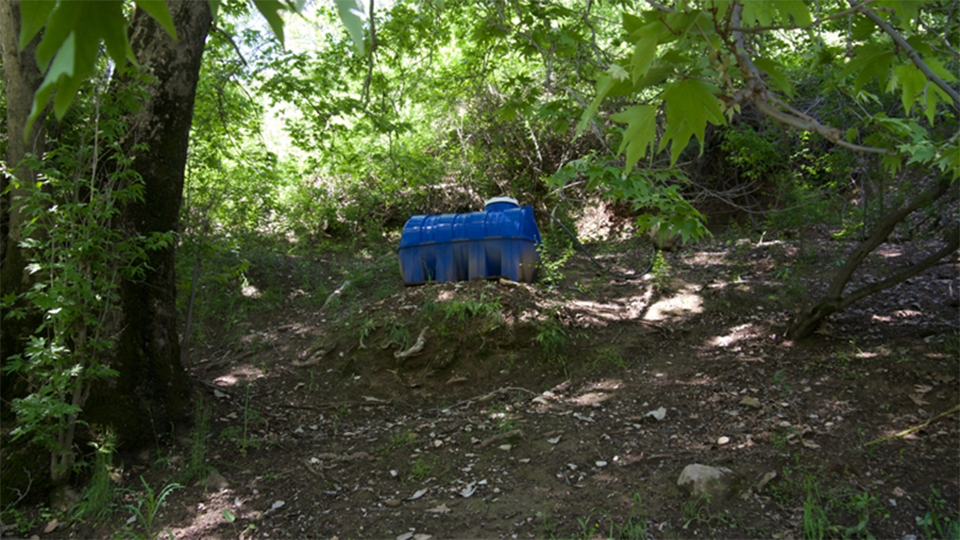

June 26, 2024
A WIPO GREEN project supports Ruzi Nav, an eco-tourism destination in Tajikistan, install solar panels and water purification systems. This project provides clean water and reduced reliance on traditional energy sources. The success of the project can be a blueprint to inspire the surrounding communities to adopt green solutions.
In Pamir Mountains of Tajikistan lies a hidden gem called “Ruzi Nav”, which translates to “New Life”. This recreational compound, owned by Saydali Khusaynov, a father of four and a passionate entrepreneur, offers a unique opportunity to experience the breathtaking beauty of the region. However, Saydali faced a significant challenge: providing basic amenities like clean water and hot water, crucial for attracting tourists, in a remote location far from traditional infrastructure.

WIPO GREEN’s project, “Accelerated Deployment of Green Technologies for Better Access to Water in Tajikistan”, implemented with the WIPO Division for Transition and Developed Countries (TDC), helped respond to this challenge. Recognizing the potential of Ruzi Nav, the WIPO GREEN on-ground team represented by Moores Rowland Tajikistan (MRT), a consulting firm, proposed a solution that was both innovative and sustainable - harnessing the power of the sun.
The mountainous location of Ruzi Nav presented a unique set of obstacles. Laying traditional power lines was not only geographically difficult but also prohibitively expensive. Additionally, proper filtration is required to enhance the water quality for consumption.
The MRT team, led by engineers, conducted a thorough analysis. Their solution was multifaceted:
This green technology solution was perfectly suited for the region, which is bathed in sunshine for over 300 days a year. Not only was an environmentally friendly, but it also proved to be cost-effective and practical.

The impact of the project transcended the provision of basic amenities. With access to clean water and hot water, Ruzi Nav could now offer increased comfort to its guests. This, along with the breathtaking scenery and organic produce from Saydali’s local farm, made the compound a truly attractive eco-tourism destination.
The success of Ruzi Nav’s green transformation had a profound effect on the surrounding communities. Local residents, for the first time, witnessed the practical applications of solar panels and water purification technologies. This sparked a newfound interest in “green” solutions, a trend that extended beyond the borders of Baljuvan. People from nearby villages started visiting Ruzi Nav, eager to learn about the implemented technologies.
“The green technology solution proposed by the Moores Rowland Tajikistan team was unconventional yet realistic and quite applicable in the context of my compound. I am truly grateful to the specialists of Moores Rowland Tajikistan for their free of charge technical advisory and fundraising support”, say Saydali.
Saydali’s journey had several challenges. He had previously struggled to secure funding for his vision. However, the WIPO GREEN team facilitated meetings with representatives from various organizations, including the World Bank-funded Rural Development Economy Project (REDP) and a local solar panel producer, Systemavtomatika LLC.
Through a series of discussions and a well-developed business plan, Ruzi Nav secured a grant of US$ 16,225 from the REDP. Systemavtomatika LLC provided the necessary equipment, and the MRT team offered continuous technical support throughout the installation process.
The project’s success story doesn’t end here. The implementation of green technologies has led to the creation of four new jobs at Ruzi Nav, empowering local women with new opportunities. Additionally, the improved guest experience has translated into increased tourist footfall, boosting the compound's revenue.
Saydali is confident that the savings from solar energy will further enhance his financial standing. He envisions a future where green technology solutions not only improve the social infrastructure of the region but also empower others to explore self-employment opportunities.

According to the Asian Development Bank, a substantial part of Tajikistan’s water treatment and distribution frameworks need to be upgraded. Over three million inhabitants, largely concentrated in rural areas, are still navigating the challenges of lacking access to safely managed water supply services. This deficiency is not just a health hazard but also an economic conundrum, with the losses incurred surpassing the projected costs of infrastructural advancements.
The World Bank has said that two-thirds of rural households in the country are yet to be connected to piped water supplies, with women and girls bearing the disproportionate brunt. The challenges are multifaceted, extending to sporadic access and water contamination, all exacerbated by the country’s rugged and isolating terrain.
Inefficiencies in water management and the deteriorating state of the infrastructure may impede the country’s economic growth and development. Estimates suggest that the investment gap to revamp water and sanitation services in Tajikistan is equal to 1.25% of the GDP, while the economic costs incurred due to the lack of these services is pegged at 4.25% percent of the GDP.
The agricultural sector, which is a vital component in in the national economy, engaging approximately 45% of the workforce and contributing to 23% of the national GDP, needs constant supply of water.
Access to water a not local issue. The United Nations recognizes access to clean water, sanitation and hygiene (WASH) as a fundamental human right, and Sustainable Development Goal 6 aims to ensure everyone has it. However, nearly 3.6 billion people face water scarcity, and this problem is expected to worsen. Thankfully, innovative water-management technologies like early warning systems and drones are being developed to address this challenge. A WIPO GREEN Global Challenges Brief addresses a few paths in which innovative water-management technologies have developed.
Tajikistan has taken a proactive policy approach, exemplified by its Green Development Policy 2023-2037. The policy serves as a compass, guiding the nation towards a green economy, fortified climate-prone sectors, and sustainable growth.
WIPO GREEN remains dedicated to providing green technology solutions for local entrepreneurs like Saydali. This project serves as an example of how sustainable innovation can transform lives and pave the way for a brighter future in the heart of the Pamir Mountains. The project is financed and supported by the WIPO Division for Transition and Developed Countries (TDC).
With acceleration projects in diverse regions like Asia and Latin America, WIPO GREEN can find best practices in Tajikistan. Through local consultants and organizations, the entity identifies communities with pressing water needs, facilitating the implementation of climate-smart technologies and potentially connecting them with funding avenues.